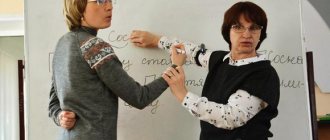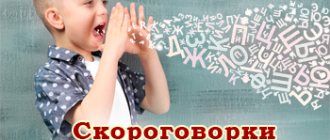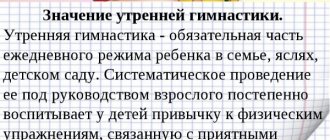Under the guidance of a speech therapist - the principle of successful speech development
Only a speech therapist can solve a problem with pronunciation in a comprehensive manner.
Caring parents, trying to save their child from possible complications at school, begin to work with him on speech development. A properly designed exercise program and competent work methodology will bring tangible results in two directions :
- Active expansion of the lexicon , the child becomes aware of the peculiarities of the composition of words of different parts of speech;
- Improving oral speech , which, in turn, mobilizes the areas of the brain responsible for thinking, memory, alertness, concentration and reaction.
However, maximum results can only be achieved in suitable living and learning conditions. And for this it is necessary to provide the child, especially if he suffers from speech impairment, with classes with a speech therapist.
A school speech therapist deals with problems in the field of speech defects, correction and prevention of speech disorders, and has knowledge from various fields of pedagogy, humanities, exact and natural sciences related to speech and medicine, psychology, neurolinguistics and other related disciplines. Classes and consultations with a speech therapist will help to competently and timely diagnose the disorder, create a set of necessary exercises aimed at correcting and further eliminating problems in pronunciation .
At the same time, the work of a speech therapist in school is not limited to solving specific problems of correcting specific violations in individual students. Its main goal is to systematically identify children with speech impediments from the stream of students.
Communication, training, adaptation - vectors of speech therapy education
Classes with a speech therapist teach children to adapt to various life situations.
Speech therapy classes help children not only in their speech practice, but also simultaneously develop their learning skills and cognitive functions, prepare them for intensive work with teachers , and teach them to separate play and learning activities.
Formation of arbitrariness
During the border period between preschool life and within the walls of an educational institution, is especially important, along with the development of speech, to form in the child a correct perception of the new reality . More than half (78%) of six-year-old children are not mentally prepared for school; in the case of seven-year-old children, the percentage is half as much, but also remains significant (20-30%). And here a specialist should also come to the rescue.
The researchers came to the conclusion that a child who is psychologically ready for school must have a sufficient level of voluntary and volitional development.
Undeveloped voluntariness can be inherent even in gifted children who are distinguished by cognitive activity.
Despite this, they may make mistakes that are not related to either grammar or dysgraphia, which is typical for children with speech disorders. This is often expressed in the design of the letter - sloppiness, dirt in notebooks, insufficient pressure on the pen, low writing speed.
Such children make the following specific mistakes :
When writing
- do not distinguish between “k” and “p”
- incorrectly copied from the board;
- incorrectly reproduce sentences, phrases, words and sounds
- get tired and make more inaccuracies by the end of the lesson
- has difficulty working with the alphabet
- has difficulty mastering basic spelling patterns
When reading
- skips or repeats pronunciation of lines
- reads with errors
- reads slowly
- doesn't remember what he reads well
Voluntary skills require the child to be aware of his own behavior ; he must be able to treat himself as if from the outside, looking at himself a little detached, and analyze the order of his actions. In the conditions of modern education, it is quite difficult to form voluntary attention in children, since all tasks come from an adult, and the child only has unquestioning obedience.
Stages of preparation for voluntary activity
In order for a child to be prepared for voluntary activities, he needs to go through several communication stages from a very young age.
- At the first stage, the word acts as the final phase of any action; it seems to consolidate the result.
- At the next level , at an older age, the child already sets the task in verbal form, and only then does action follow.
- By the age of 5-6 years, a child can already regulate his behavior and control his actions, accompanying them with speech.
It is competent speech, clearly formulated tasks and plans that allow you to achieve your goals. As a result, a first-grader who has mastered the skills of voluntary activity can already distinguish the main from the secondary and analyze the speech space.
The development of voluntary attention will help to form and develop creativity in a child, the ability to communicate successfully, solve problems of varying complexity, and quickly and painlessly adapt to new conditions. All this can be achieved in classes with a speech therapist teacher, in small groups, where both an individual approach and team activities are important.
For more information about the competencies of a speech therapist, watch the video .
The main tasks of the correctional work of a speech therapist teacher in a preschool educational institution. Presentation on speech therapy on the topic
Slide 1
“The main tasks of the correctional work of a teacher-speech therapist in a preschool educational institution” Performed by a teacher-speech therapist of MDOU No. 44 “Druzhok” Nikitina Alesya Vladimirovna
Slide 2
Correct speech is one of the indicators of a child’s readiness for school, the key to successful development of literacy and reading in the future: written speech is formed on the basis of oral speech. If violations of sound pronunciation, vocabulary, grammar, phonemic processes, etc. are not corrected in time, preschool children will have difficulties communicating with others, and in the future certain personality changes along the development path “child - teenager - adult”, when a person’s complexness will interfere with him learn and fully reveal your natural abilities and intellectual capabilities.
Slide 3
The main objectives of correctional and developmental activities are: creating a team of like-minded people, which includes a speech therapist, educators, music directors, and a physical education instructor. increasing the professional level of all specialists; organization of a correctional and developmental environment that stimulates the child’s speech and personal development.
Slide 4
tasks Build a mechanism for interaction between specialists. Carry out close interaction with parents; Timely identify children with speech disorders; Create a spatial speech environment in a preschool educational institution; Correct and prevent speech disorders in all types of activities.
Slide 5
Interaction between a speech therapist and teachers, music director, and physical education instructor. The success of joint correctional and pedagogical work with children with speech impairments largely depends on the properly organized interaction of the speech therapist, teachers, music director, and physical education instructor. Each of them, solving their own problems defined by educational programs and regulations of preschool educational institutions, must take part in the formation and consolidation of correct speech skills in children, the development of the sensorimotor sphere, higher mental processes and health promotion. It is important that the speech therapist systematically inform teachers about the progress of children in speech development, and group teachers monitor compliance with a unified speech regime in the classroom. In his classes, the music director forms the tempo-rhythmic side of speech and promotes the automation of sounds through specially selected chants and songs. The physical education instructor, at the request of the speech therapist, conducts a set of exercises for muscle relaxation, which optimizes the process of sound production. The forms of work with narrow specialists are varied - these are consultations, seminars, open classes, logorhythmics, assistance in selecting appropriate methodological literature, organizing speech work with children, etc.
Slide 6
Interaction between a speech therapist and parents The family is the first social community that lays the foundations for a child’s personal qualities. In the family he acquires initial communication experience. In kindergarten, the child receives individual speech therapy assistance, so its effectiveness depends, among other things, on the degree of interest and participation of parents in speech correction. Firstly, parental opinion is the most authoritative for the child, and secondly, parents have the opportunity to daily consolidate the skills they are developing in the process of everyday direct communication (on walks, excursions, while visiting the theater, caring for plants and animals, helping adults at home and in the country). The joint work of a speech therapist with parents is an integral part of the entire pedagogical process and is carried out in the following forms: personal contact; participation in parent meetings; conducting group consultations for parents on organizing the correction process, familiarizing themselves with specific techniques for producing sounds; individual consultations; filling out notebooks for homework; holding open classes; decorating a corner for parents.
Slide 7
Goal: to develop in the child the skills and abilities to accurately use speech sounds in all communication situations. Objectives: 1.formation of movements of the organs of the articulatory apparatus through articulatory gymnastics. 2.formation of an air stream. 3. development of auditory attention. 4. development of sound analysis. 5. achieve correct pronunciation of sounds in coherent speech. Correction of sound pronunciation
Slide 8
Speech therapy articulation massage; fingers; muscles of the face and neck. Goals: 1.Normalization of muscle tone. 2. Indirect stimulation of the speech area in the cerebral cortex. 3.Development of fine motor skills and accuracy of pronunciation.
Slide 9
Development of fine motor skills It has been proven that the development of the hand is closely related to the development of speech and thinking. There are “active points” on the fingers and palms, massage of which has a positive effect on the child’s well-being and improves brain function in general. Tools for developing fine motor skills: Hedgehog massage balls Plasticine. Cereals, beads, buttons. Sand. Threads, braid, ropes, laces, fabrics. Pencils, counting sticks. Paper. Dolls. Water.
Slide 10
Visual gymnastics Goals: 1. Strengthening blood vessels. 2. Relaxation of the eye muscles.
Slide 11
Development of general motor skills To develop general motor skills in children with speech disorders, outdoor games are used, which develop in children the ability to navigate in space, change the pace of movements, and move rhythmically and deftly. These games are held during physical education classes, during outdoor games hours, and during music and choreography classes. Gross and fine motor skills should be developed in parallel, offering the child exercises appropriate to his age and capabilities. Using the example of simple exercises for the development of general motor skills - movements of the arms, legs, torso - you can teach him to listen and remember tasks, and then complete them.
Slide 12
Articulation gymnastics Correct pronunciation of sounds is ensured thanks to good mobility of the articulation organs, which include the tongue, lips, lower jaw, and soft palate. Work on the development of the basic movements of the organs of the articulatory apparatus is carried out in the form of articulatory gymnastics. The goal of articulatory gymnastics is to develop full-fledged movements and certain positions of the organs of the articulatory apparatus necessary for the correct pronunciation of sounds. Articulation gymnastics must be performed daily so that the skills developed in children are consolidated.
Slide 13
Advice from a speech therapist on speech development 1. Do not try to speed up the child’s natural speech development. Don't overload him with speech activities. Games, exercises, speech material must be age appropriate. 2. Do not imitate children’s speech, do not abuse diminutive suffixes - all this inhibits speech development. 3. Correct the child’s speech deficiencies in a timely manner, trying to point out inaccuracies and errors found in his speech, be careful, do not laugh at the baby under any circumstances, the best thing is to tactfully correct this or that word if the child is in a hurry to express his thoughts or speak quietly , remind him: “You need to speak clearly, clearly, and slowly.” 4. Do not leave your child’s questions unanswered. And don’t forget to check: “Does he understand your answer?” If there is a tape recorder in the house, record the child’s speech. Such recordings will not only help in working on speech, but over time will be a good gift for a son or daughter. 5. Read works of fiction to your child as much as possible! The characters of the heroes must be drawn with facial expressions, voice, and plasticity.
Slide 14
References 1. Maksakov A.I. Development of correct child speech in the family. – M.: Mozaika-Sintez, 2006. 115 p. 2. Ovchinnikova E. V. Organization of cooperation between a speech therapist and parents // Speech therapist, 2007, No. 6. P. 74-78. 3. Stepanova, O. L. Organization of speech therapy work in preschool educational institutions / O. L. Stepanova, - M., 2007. 4. Arkhipova E. F. Early diagnosis and correction of developmental problems. The first year of a child’s life // Library of the program From birth to school. Correctional work in preschool educational institutions. M.: Mozaika-Sintez, 2012 5. Correctional and pedagogical work in preschool institutions for children with speech disorders / Ed. Yu.F. Garkushi. – M.: Sekachev V.Yu., Sfera shopping center, 2007. 6. Filicheva T.B., Chirkina G.V., Tumanova T.V. Correction of speech disorders. Programs of compensatory preschool educational institutions for children with speech impairments. –M.: Education, 2010 7. Filicheva T.B., Chirkina G.V. Corrective education and upbringing of 5-year-old children with general speech underdevelopment. — Moscow 1991
Slide 15
Thank you for your attention








